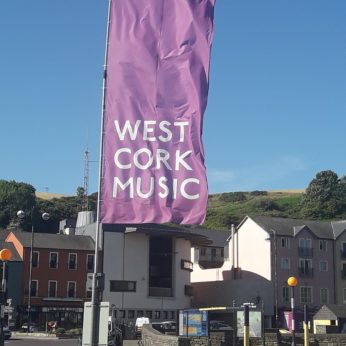Composer: Chiara Margarita Cozzolani (b. 1602 - d. 1676)
Performance date: 30/06/2019
Venue: St. Brendan’s Church
Composition Year: 1602 - 1676
Duration: 00:06:18
Recording Engineer: Gar Duffy, RTÉ
Instrumentation Category:Baroque Ensemble
Instrumentation Other: s-solo, 2vn, vc, hpd
Artists:
Ensemble Dagda (Clodagh Kinsella [soprano], Caitríona O'Mahony, Marja Gaynor [violins], Norah O'Leary [cello], Kieran Finnegan [harpsicord]) -
[baroque ensemble]

Her
composing career seems to have ended with her appointment as Abbess of
the Convent. As Abbess, Cozzolani came into conflict with the
authorities, particularly archbishop Alfonso Litta. Her works suggest
why. Polyphony was forbidden apart from high holidays and the only
appropriate instruments were keyboards, and if absolutely necessary,
viol. Cozzolani’s larger works are for collections of up to 8 voices in
polyphony, complete with low parts which would likely have been filled
in by Santa Radegonda’s extraordinary trombone players, a most
inappropriate instrument for women in general and nuns in particular.
Like
her fellow nun-composers, Cozzolani’s music is no bloodless piety. Her
texts tend towards the erotic, with some imagery as intense as any of
Barbara Strozzi’s titillating songs. Amongst her Concerti Sacri is a
substantial motet dwelling on drinking the life-giving milk from the
breast of the Virgin, and the life-giving blood of Christ from his
wounds of the Cross.
|
Laudate |
Praise |
|
laudate |
praise |
|
Quoniam confirmata est super nos misericordia ejus, |
For |
|
et |
and |
|
Gloria Patri et Filio et Spirito Sancto |
Glory |
|
sicut erat in principio et nunc et semper |
As |
|
in |
World |
|
Amen |
Amen |
Copyright © 2024 West Cork Music. All rights reserved.
Designed and developed by Matrix Internet